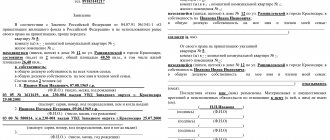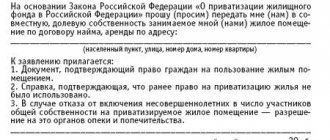Definition
What is privatization? According to the current Housing Code of the Russian Federation, citizens' right of ownership of housing can arise as a result of its free privatization, that is, the transfer of state or municipal housing into private ownership through a special legal procedure. After privatization, the owner of housing (usually an apartment) has the right to dispose of it, that is, to give, sell, bequeath, mortgage, etc. You can participate in the privatization of housing only once in your life.
In the same way, any operations with land plots are possible only after the privatization of the land has taken place, the procedure for which is established by the Land Code of the Russian Federation. Citizens using land plots for a specific purpose indefinitely or with the right of lifelong inheritance have the opportunity to privatize them free of charge.
Is re-privatization possible?
Citizens have the right to carry out free privatization only once, and they will not be able to use it again to purchase another apartment - as stated in Article 11 of Law No. 1541-1. An exception is made for minors, and there is one consequence from this: if the right of citizens to privatization has already been used earlier, but it needs to be carried out, the only option left is to register it for children.
An exception may be made for the loss of housing due to a natural disaster, man-made disaster, terrorist attack and other similar emergency incidents - citizens who lost their housing because of them have the right to re-privatization.
It can also be used by immigrants from the North or from the countries of the former USSR - but it is required that they transfer their housing at their previous place of residence to the previous owner. If this is not possible, since it has already been transferred to third parties, then re-privatization will not be possible.
In the usual case, it will not become possible even after deprivatization, that is, the transfer of housing back to the state - it is sometimes practiced to solve problems with paying for it. This is true for cases in which it was carried out at the request of the owner himself.
But if the privatization agreement was declared invalid due to the fact that it violated someone’s rights, and this was done on the initiative of the one whose rights were violated, or government authorities, then the transaction is considered completely imperfect, and therefore the citizen’s right to privatize the apartment for free - unused.
The state of the housing privatization process in Russia
Today, approximately a third of the housing stock in Russia has not yet been privatized. At the same time, municipal housing has mostly already been transferred into private hands. Therefore, local authorities do not have a social housing fund at their disposal to provide it to low-income people on the waiting list, residents of dilapidated buildings and other categories of citizens entitled to receive it. Thus, those on the waiting list are doomed to long years of waiting, despite the fact that the non-privatized part of the housing stock could become the basis for the formation of a social housing stock due to the natural decline in the number of tenants. It is precisely these considerations that have constantly forced many legislators to oppose extending the privatization deadline.
When will privatization end?
The free privatization of housing began in 1992. At first, this process was generally open-ended. However, the adopted new Housing Code of the Russian Federation established its end date - January 1, 2007, which was shifted three times even before the current year: first to 03/01/10, then to 03/01/13, and finally to 03/01. 15
At the end of February of this year, one of the leaders of the faction of the A Just Russia party in the State Duma, Ivan Grachev, said that his faction was in favor of extending privatization for another three years - until 03/01/18. However, this proposal was opposed by the faction of the United Russia party. As a result of inter-factional negotiations, a compromise was found, as a result of which the deadline for the privatization of residential premises occupied by citizens on social rental terms was extended only until 03/01/16.
What caused the latest shift in the end of privatization?
What is housing privatization? This is a way to support citizens in difficult economic times. After all, not all Russians managed to exercise their right in previous years. It is not without reason that the explanatory note to the bill on changing the deadlines states the inadmissibility of depriving citizens living in dilapidated and dilapidated housing and awaiting resettlement of their legal right to free privatization of housing.
People on the waiting list for social housing may find themselves in the same situation. After all, if they receive it after 03/01/16, then they will not have the right to privatize it, i.e. they will be disadvantaged in their rights compared to those who managed to privatize housing before this date.
In addition, the extension of privatization was the topic of a large number of requests from Crimeans and Sevastopol residents, since they had little time to prepare documents based on Russian standards. And indeed, only one year has passed since the moment when two new entities appeared within the Russian Federation. Obviously, this period was clearly not enough. Today, Crimeans calmly submit relevant applications, which are considered within up to 2 months.
The shift in deadlines will reduce queues at government agencies, which will speed up the privatization process itself. And for it to go smoothly, you need to know all the intricacies regarding the registration of social housing into private ownership.
Obtaining consent
As the legislation indicates, in order to carry out privatization, the consent of persons with permanent residence registration or their written refusal to participate in the procedure is required. But this requirement does not apply to everyone; it is not necessary to obtain consent from citizens:
- who have already used the right to privatization;
- who provided a written refusal;
- under fourteen years of age;
- in respect of which there is a court decision on eviction.
Each of the other participants in privatization must agree to it in writing. The exception will be those of them who are not yet fourteen years old - their consent is not required. The point here is that if other citizens can write a refusal and retain their right to privatize some other apartment in the future, then children cannot do this, and in any case they will be participants in the privatization. But they don’t lose their right either, and will be able to participate in privatization again in the future.
If the child is between 14 and 18 years old, then it is required not only that he agree to participate, but also that his parents or guardians agree with this - documents can only be signed in front of them.
Those persons who are temporarily absent at the time of the event, for example, those undergoing military service or serving a sentence, can also apply. After returning, they have the right to challenge the privatization on the grounds that they also had rights, and through the court to seek its cancellation.
Incapacitated persons can privatize an apartment, but a guardian will have to act on their behalf.
If a citizen does not intend to take part, but also does not want to interfere with the event, it is possible to issue a refusal. Be sure to do this in writing and have the document certified by a notary, otherwise it can be protested and declared invalid.
But it is impossible to draw up a refusal in favor of a certain person; instead, the share of the “refusenik” will be distributed equally among the other participants in the privatization. Even after this, the one who refused will still have the right to use the premises, and he cannot simply be taken and evicted at the will of the owners, even if the apartment then goes to other people - nothing depends on the change of owners, this is a lifelong right. That is, it is not passed on to heirs.
If you still want to not only refuse, but do it specifically for someone’s benefit, the best way out would still be to participate in the privatization procedure, and then draw up a gift agreement for the right person. Of course, the possibility of participation in the future will be closed.
In some cases, it is not possible to obtain either consent or refusal, and privatization has to be carried out using a court decision. You can contact him, there is:
- the location of one of those assigned has not been established, or it is known that he lives in another place;
- a refusal was received from the municipality;
- housing is not listed in the state register.
If a registered citizen has not lived in the apartment for a long time, then he must first be deregistered through the court, and it is necessary to provide evidence of his long-term absence.
In all cases where it was first necessary to resolve the problems through the court, when registering the transfer of ownership in Rosreestr, it will be necessary to present the court decision along with the other documents necessary for this.
Will housing privatization be extended again?
It is still difficult to predict the future scenario of housing privatization in Russia. The current deadline was adopted as a result of compromise. There are three possible scenarios for resolving the issue:
- Privatization will be paid. After 03/01/16, citizens who wish to make the social housing in which they live their own will buy it from the state for a certain percentage of its market or cadastral value.
- The Soviet system of free provision of housing to those on the waiting list will be replaced by a non-commercial rental agreement. Today, tenants use non-privatized housing indefinitely under the terms of a social tenancy agreement, and after their death or departure, housing is transferred to their registered children or grandchildren (if any) or given to those on the waiting list if there are no registered relatives, and also until 03/01/16 such housing can be privatized . This scheme can be replaced by the provision of social housing for temporary use on a rental basis, and it will not be possible to privatize it.
- It is possible that privatization after March 1 next year will remain free only for some categories of citizens, and for all others the issue will be closed completely.
- No one knows yet what decision the authorities will make. Whether privatization will be extended or not is anyone’s guess. But the procedure for transferring state or municipal housing into private ownership should exist even after the completion of free privatization. Its procedure should be set out in a separate federal law, but today there is no such law. Therefore, you need to remember that privatization of an apartment on March 1 of next year in the free version will become impossible.
What means?
Apartment privatization – what is it? Privatization of an apartment is the process of transferring state property into private hands .
Typically, such a transfer is used to generate additional revenue for the budget or to get rid of problematic property complexes. Housing privatization has completely different goals.
Russia is following the market path of development. It is necessary to transfer the work of housing and communal services to these rails.
Pay attention to modern apartment buildings: homeowners, united in partnerships, enter into contract agreements for the provision of utilities and maintenance of their houses.
In this case, state governing bodies perform an exclusively supervisory function . State residential premises in which people live under a social tenancy agreement do not fit into this scheme at all And today such apartments still make up about 14% of the total housing stock.
What does privatization of an apartment give, why is it necessary for a specific person? After it, the tenant of the apartment gets the opportunity to do whatever he wants with his, now, real estate: sell, exchange, bequeath or donate. Now the tenant has his own housing , and he received it completely free of charge .
However, there are also pitfalls in this process. Therefore, in the next section we will discuss whether it is worth privatizing an apartment in Khrushchev.
Pros and cons of housing privatization
A citizen living in a municipal or state housing fund apartment does not have the right to dispose of it. Being state property, the apartment will pass to the municipality in case of non-payment of utilities or after the death of the childless responsible tenant included in the order.
What is apartment privatization? It will give you the opportunity to sell, donate, rent out or mortgage your home to a bank. Finally, an elderly and single apartment owner can enter into a lifelong maintenance agreement with someone (with a dependent or with the payment of rent) in exchange for the transfer of ownership of the apartment after his death.
Any person can be registered or registered into a privatized apartment at the discretion of the owner; it can be bequeathed or inherited in accordance with the legislation of the Russian Federation.
A privatized apartment can be redesigned, thus improving your living conditions.
However, privatization also has contraindications.
So, if you live in a dilapidated house and are waiting for resettlement, then there is simply no point in engaging in privatization. After all, even if the privatization of housing stops after 03/01/16, no one has yet canceled the Federal Target Program “Housing”. So, social housing will continue to be provided free of charge to residents of dilapidated buildings.
It is also not at all profitable for residents of communal apartments to privatize them, since it is much easier to get the municipality to move them into social housing apartments than to sell a communal apartment or a privatized room in a dorm.
Owners of privatized apartments pay an annual property tax and pay for the maintenance and repair of common property. Therefore, for single and elderly citizens with minimal income, a privatized apartment can become a burden, however, if these costs are not covered by any trustee under a lifelong maintenance or annuity agreement.
And finally, all heirs can claim a privatized apartment if the owner has not made a will. In order for an apartment to go to a specific person, you need to make a list, and this is quite a troublesome task.
What is the difference?
The reasoning of those people who ask: why privatize an apartment shows their orientation towards the care of the state. They say that their houses will be repaired at the expense of the budget, their living conditions will be improved, and there is no point in transferring the occupied premises into ownership.
But who can guarantee that this will always be the case? Now the fee for using a non-privatized apartment under a social tenancy agreement is several hundred rubles .
But it may well grow if there is no longer enough money in the municipal budget. The owner of the home, represented by local authorities, will say that the residents use the property, but underpay for their accommodation.
For now, this is just a negative scenario for possible developments. But real estate is an investment for the long term. And in such a time, a lot can change in state policy. This is not the only difference between a privatized apartment and a non-privatized one.
The older generation still remembers how all apartments were state-owned and given out free of charge, but now it’s hard to even imagine.
You must decide for yourself whether to privatize the apartment or not.
Privatization of an apartment: documents
When carrying out any redevelopment in a non-privatized apartment, they should be legalized according to all established procedures. Otherwise, privatization will not be allowed, and the tenant will have to return the apartment to its original appearance.
Persons directly claiming a share in the ownership of an apartment, or their attorney, must contact the BTI (or MFC) to draw up a privatization agreement with a package of documents, which includes:
- Order or social tenancy agreement for an apartment. If they are not available, these documents are ordered from the EIRC (in those cities where they are created, for example in Moscow).
- A cadastral passport obtained from Rosreestr and a technical passport issued from the BTI.
- Apartment personal account, which indicates that utility bills have been paid and there is no debt on them.
- Documents confirming the identity of each person claiming a share in the ownership of the apartment.
- Everyone who is registered in the apartment must be indicated in the provided extract from the house register.
- Citizens registered in the privatized apartment who previously participated in privatization provide Certificates in Form No. 2 about their non-participation in privatization.
- An extract from Rosreestr issued by the Property Management Department of Rosreestr or the district administration.
- Extract from the Unified State Register of Rights to a privatized apartment.
- Extracts from the Unified State Register of Rights in form No. 3 for each privatization participant with a list of real estate objects in their ownership and the grounds for their acquisition.
If a child with a guardian is registered in a privatized apartment, then the following is provided:
- a document confirming his appointment;
- permission to participate in privatization;
- if there are minor children specified in the social tenancy agreement, but discharged from the privatized apartment, they are obligatory participants in privatization, and therefore are granted: permission to participate in privatization; extracts from house books from the child’s previous and new place of residence.
If, to carry out a procedure such as privatization of an apartment, documents are submitted by an attorney, then he must have notarized powers of attorney from all those claiming a share in the ownership of the apartment.
After at least two months, the privatization agreement is drawn up in a number of copies equal to the number of privatization participants.
This must be followed by an application to the Registration Chamber in order to register ownership and obtain the appropriate certificate.
How to privatize an apartment and why privatization is needed
Having no idea about privatization, it is not surprising that some Russians do not understand why housing needs to be privatized at all. For a clear understanding, we list everything in order:
- You become the owner of real estate. Immediately after receiving ownership rights, you can make any transactions with housing at your discretion.
- From the moment the privatization process is completed, you become the potential owner of a certain amount of money (the one for which you can sell the apartment).
- You can improve your living conditions or expand by selling privatized housing, adding money to the amount received and buying a new, more spacious one.
- In the event of resettlement of residents by a development company, the owners of privatized housing will receive those apartments that the company agrees to buy for them, and the remaining residents will receive in accordance with the Housing Code. That is, owners of privatized premises will receive housing of much better quality.
The sale of a non-privatized apartment and transactions such as donation, will, exchange, and collateral will be impossible.
If you want to have full control over your home, then you will have to follow 5 important steps:
- Obtain the consent of everyone who has the right to privatize residential premises.
- Register the property with the cadastral register (you can check whether it is registered or not on the website https://rosreestr.ru/wps/portal/p/cc_ib_portal_services/online_request). If it has not been registered before, then you first need to obtain a technical passport. To do this, you need to contact the MFC or BTI with an identification document and a warrant or social rental agreement (it usually takes from 7 to 14 days to produce a registration certificate).
- Collect the required documentation from the list.
- Send the papers to draw up a privatization agreement to the MFC or other authorized organization.
- Submit an agreement to register property rights to the Registration Chamber or MFC.
- Pick up the privatization agreement on the appointed day. Until June 2016, certificates of registration of property rights were issued, and now an extract from the Unified State Register of Real Estate is issued about the property.
Determination of the future owner
The right to participate in the privatization of municipal housing are citizens who are listed in the social tenancy agreement (this is the tenant and members of his family) or the order (this is the main tenant and members of his family), as well as all other people registered in this premises.
Citizens who have the right to participate in privatization are required to agree to the procedure or draw up a written refusal.
If one of those registered does not agree with privatization, then without his participation it will not be possible to carry out it. They won’t even accept your documents for review.
And if, due to inexperience, they are accepted, then in the future they will with 100% probability refuse to draw up a contract for the privatization of the apartment.
There is only one way out in such a situation - to persuade with all your might the one who is against the procedure - he must either take part or officially refuse.
If he has not lived in the property for a long time and does not pay utility bills, then you can go to court with a demand to discharge him. Immediately after receiving a positive court decision, it must be sent to the passport office and the person must be discharged from among those registered.
Then you can privatize the apartment without his participation legally.
Preparation of documents
There is no list of documents for privatization provided by federal law. Each region has the right to establish its own list.
For example, residents of Moscow need to write an application for the provision of a public service and attach to it:
- The applicant's civil passport and identification documents of all family members and those who are registered in the privatized property and have the right to use this premises on social rental terms. If children under 14 years of age participate in privatization, their birth certificates must be attached.
- Social lease agreement for real estate.
- An extract or warrant from an order issued by a government authority. If you have lost the order, you will have to obtain a copy of the order from the archives. In MSC it is possible to take it at any MFC completely free of charge.
- A document confirming Russian citizenship (for children under 14 years of age). You can get it at the multifunctional center. But if both parents officially have Russian citizenship and are registered in the privatized housing, then this certificate is not necessary.
- An extract from the house register or similar paper for the period from July 1, 1991 to the day of registration in the privatized housing. You can get it from the HOA (UK, housing cooperative, etc.) or from the MFC.
- A document that confirms that the applicant has the right to participate in privatization and it has not yet been used at his previous place of residence. It is issued by an authorized body (local government body or technical inventory organization body). But in addition to this, you still need to obtain a document confirming that a specific authorized body has the right to issue such documents.
- Consent or refusal to participate in privatization in writing. These papers must be drawn up in accordance with the approved form. In addition, they must be certified by a notary or they must be signed under the personal supervision of MFC employees.
- Technical passport for real estate. You need to order it from BTI.
- Floor plan of the building. This document is also issued by the BTI upon request.
- An extract from the personal account, which lists who lives in the home.
Note! If military personnel, incapacitated people, children without parental care or special personnel take part in privatization. organizations – additional papers will need to be added to the above list.
For example, a notarized power of attorney, if the application and everything else is submitted by a representative, or a decision of the guardianship/trusteeship and patronage authority, if the papers are submitted by a guardian of a person under 18 years of age.
All of the above documents have different validity periods. For example, a social lease agreement and an order are unlimited. The floor plan of the building and the technical passport also have no time limits, but in rare cases they may be asked to update.
But a certificate of absence of debts on utility bills and an extract from a personal account are valid for only 30 days.
Reference! It is better to first check with the MFC the list of required documents in your region and immediately find out when the deadline for each of them expires. This will also help you figure out which paper to run for first and what to leave for last. This way you won’t have to receive the same document a second time.
Organizations to contact
You can submit documents to begin the privatization process by visiting the relevant institution in person or remotely through the government services portal:
- Privatization of an apartment through the MFC . To do this, you need to visit one of the territorial centers. You can choose the one that suits you according to the location that is convenient for you. You will be provided with a sample application to complete. If you have already completed it at home yourself, then you will only have to sign it at the document acceptor. Be sure to attach the collected package of documents to it. The MFC employee will then give you an inventory document, which will indicate the preliminary date of the inspection results.
- Privatization through your personal account on the public services website . To do this, use the website https://www.gosuslugi.ru. But this method is not available to residents of all regions of Russia. To submit an application, find the privatization service in your personal account using the search, fill out the application and attach documents electronically. If something is missing, you will be sent an email or invited to come in person with the required paper.
Reference! Residents of Moscow can still submit documents for privatization of an apartment on the official portal of the Moscow Mayor https://www.mos.ru/pgu/ru/services/procedure/0/0/7700000010000294638/. There you can also find a list of required documents and the procedure for submission. Residents of St. Petersburg can still submit papers for privatization through Gorzhilobmen https://obmencity.ru/.
Signature and registration of the privatization agreement
Once the application and attached papers are approved, at your next visit to the MFC you will be able to sign an agreement on the transfer of real estate into personal ownership.
All privatization participants with passports must be present to receive this document in order to sign the agreement under the supervision of an MFC employee.
After this, you need to register ownership. To do this, you need to resubmit the signed agreement on the transfer of ownership of the apartment to the MFC or Rosreestr. The registration period is slightly different in the two cases:
- This will take the MFC up to 9 working days.
- Rosreestr will cope with the task in 7 days.
General rules of privatization
The most important rule of privatization concerns the number of times that the law gives a citizen to privatize real estate. Article 11 of Law No. 1541-1 “On the privatization of housing stock in the Russian Federation” clearly states that a Russian can privatize housing only once in his life.
But there is an exception - children who became participants in privatization under the age of 18. At the age of majority, this category of citizens is allowed to privatize housing one more time.
Privatization concerns everyone who lives in a residential building and has not previously taken part in privatization.
If you wish, you can refuse this procedure altogether. People who usually do this are citizens who already have another object in mind for privatization in the future. And sometimes it’s just the family at the family council who makes such a decision. But remember that if you refuse privatization, you still retain the right to it.
The following are not subject to privatization:
- Apartments located in a building subject to demolition.
- Property located in a closed military city.
- Service housing. But in this case there are exceptions: the owner agrees to privatization by an employee of the organization, or service housing becomes the property of the municipality on the initiative of the organization itself as a result of its liquidation or reorganization.
- Dorm rooms.
- Housing obtained not under a social tenancy agreement, but, for example, under a commercial one.
Duration of the procedure
It takes approximately 1.5 to 2 months to collect the required documentation for housing privatization. An application with an attached package of papers can be reviewed for no more than two months.
Registration and transfer of ownership takes approximately 10 days. As a result, the period for privatization of housing will be from 3.5 to 4.5 months.
Price
Paragraph 2 of Article 338.18 of the Tax Code of the Russian Federation states how much it costs to privatize an apartment. Most often it is free, but a mandatory payment of a fee for state registration of property rights in the amount of 2 thousand rubles is required.
With the participation of several shares in privatization (that is, the apartment is privatized by several people at once), the cost of the fee is divided between the participants in the process. If 4 people take part in privatization, then each will have to pay 2000/4 = 500 rubles.
Note! Paragraph 4 of Article 333.35 of the Tax Code of the Russian Federation states that when paying a fee through the state portal. Services provided to Russians are provided with a 30% discount.
Nuances of the procedure and special moments of privatization
- Features of real estate privatization with the participation of children. If children under 18 years of age are registered or living in the apartment, then during privatization they must be given a share in the home. It is possible to deprive the right to a share in an apartment only by obtaining the consent of the guardianship and trusteeship authorities, and they will agree to this only if the child is provided with another housing in return, no smaller in size and no worse in terms of conditions.
- Features of joint and shared privatization. Joint privatization was used until May 31, 2001. But despite the fact that this method of privatization is not currently used, some housing privatized before this date is still in joint ownership. As a result, adjustments were made to the privatization law regarding this point, which states that if one of the owners of joint property dies, then the shares of the participants in the apartment are determined, including the share of the deceased. The shares in this case are recognized as equal. If several persons are registered and live in the apartment, and they all want to participate in privatization, then the premises are transferred to them as common shared ownership. The agreement on the transfer of ownership of the apartment will be drawn up in as many copies as there are people participating in the privatization.
- Features of privatization in the presence of debt for utility bills . Utility debts are not a reason for refusing privatization, but passport officers in the management company or homeowners association sometimes exceed their authority and declare that they will not issue an extract from the personal account until the entire debt is repaid. In this case, you can either simply pay off the debt or oblige the HOA with the help of the court to issue the necessary document.
- Features of privatization during divorce . If the housing was privatized for both spouses, then in the event of their divorce, each will have their own share. If the apartment was privatized by them into joint ownership, then after the divorce each of them will be allocated a share. In the absence of other owners, the housing will be divided in half. If the housing was privatized for one of the spouses, and the other gave a written refusal, then the refusing party retains the right to use the apartment even after a divorce.
Tax obligations on real estate
Every year, individuals are required to pay property tax on their personal property. This point is described in detail in Chapter 32 of the “Property Tax on Individuals” of the Tax Code of the Russian Federation.
This means that immediately after the completion of the privatization process, the owner of the premises automatically becomes obligated to pay this tax.
The Government of the Russian Federation provides that local legislation can independently establish the amount of real estate tax depending on the procedure for determining the tax base.
But it is imperative to focus on the general restrictions in the Tax Code of the Russian Federation.
The maximum tax after privatization for individuals in 2021, calculated from the cadastral value, is:
- Up to 0.1% - for residential buildings (or parts thereof), apartments (or parts thereof), rooms, single real estate complexes that include a residential building, outbuildings or structures (maximum area of 50 square meters) on plots, provided for personal subsidiary plots, dacha farming, gardening, vegetable gardening and individual housing construction.
- Up to 2% - for real estate included in the approved list or the value of which exceeds 300 million rubles.
- Up to 0.5% for other property.
You can find out the exact property tax rate for individuals in your region on the website https://www.nalog.ru/rn77/service/tax/ by selecting the type of tax, term and region.
Reference! If the apartment is privatized and divided into shares, then taxes must be calculated separately for each owner. And if the size of the shares is not allocated, then the total area is divided by the number of owners.
Property taxes must be paid by October 1 of the following year following the reporting year. If you are late in payment, you will be charged a penalty of 20% of the tax amount.
Pros and cons of privatization
Privatization implies both disadvantages and advantages. Therefore, before starting this procedure, it is important to familiarize yourself with them.
Perhaps some aspect will make you change your mind or, on the contrary, you will become more confident in the need for privatization.
So, the advantages include the following:
- Ownership . If several persons take part in privatization, then each will be given an equal share in the ownership. Property owners can sell it, present it as a gift, rent it out and much more. This is clearly stated in paragraph 2 of Article 209 of the Tax Code of the Russian Federation. With the money received from the sale, you can buy another home or use it for the down payment of a mortgage to buy a more spacious apartment. The situation is exactly the same with shares.
- The apartment can be passed on by inheritance. According to Chapter 62 of the Civil Code of the Russian Federation, the owner of an apartment or share can bequeath it to anyone at his own discretion. If the owner did not make a will and died, then the property will be divided among the heirs (this is stated in Chapter 63 of the Civil Code of the Russian Federation). If an adult is specified in the will, then he will have to pay the notary 0.3% of the price of the inheritance received.
- If you have a large housing and communal services debt, no one will take the apartment to write it off. But only if it is the only place to live (subparagraph 1, paragraph 1, article 446 of the Code of Civil Procedure of the Russian Federation).
- It is impossible to expel or evict the owner. If one of the owners does not live in the property at all, then the other owners will not be able to sign him out even if he does not pay utility bills. But if other owners pay for the communal apartment, then they can recover this money from him through the court (Article 249, paragraph 325 of the Civil Code of the Russian Federation).
- It is much easier to get a large amount of money from a bank using real estate as collateral. If there is real estate that the borrower can provide as collateral, the bank will not only agree to issue a loan, but will also increase its amount and term and reduce the interest rate.
- It is possible to remodel the apartment . In privatized housing, you can move the wall (in accordance with BTI standards) or change its status to non-residential and rent it out as an office.
The disadvantages are the following:
- Every year you will have to pay the apartment tax to the treasury.
- The amount of utility bills will increase.
- Registration takes a considerable amount of time and it is impossible to carry out this procedure completely free of charge.
- No compensation will be paid in the event of a gas explosion, flood or fire.
Privatization of land in Russia
In the last quarter of the last century, many Russians acquired dacha plots obtained from their place of work. Then it was enough to become a member of a gardening partnership and receive ownership of a small plot of land, usually with an area of 6 acres.
But if earlier, in order to transfer a plot to a new owner (the heir of the previous one), it was possible to simply issue him a new gardener’s book, and the new owner took over the rights, then after the adoption of the Land Code of the Russian Federation in 2001, such a procedure is no longer possible. Today there are only two options to obtain ownership of land - formalizing a lease agreement or privatizing the site.
Under certain conditions, every Russian who uses a plot of land indefinitely or with lifelong inheritance can obtain ownership of it free of charge, subject to the following conditions:
- If he is the owner of real estate located on a piece of land that is not his property.
- If he used the land under a lease agreement for the purpose of individual housing construction or running a subsidiary plot even before the adoption of the Land Code of the Russian Federation.
- If he uses the plot with his own residential building indefinitely or with lifelong inheritable ownership.
- his land plot is owned by a gardening partnership and a garage-building cooperative. In this case, privatization is carried out according to a simplified procedure and is called the “dacha amnesty”.
What is the privatization of land plots under the “dacha amnesty”?
This is a special procedure for registering land ownership rights in accordance with Law No. 93 of September 1, 2006, popularly nicknamed the “dacha amnesty,” although it allows you to register not only land plots under dachas, but also obtain ownership of some real estate.
The subject of the “dacha amnesty” is plots of land in gardening partnerships and dacha cooperatives that were provided to their users before the adoption of the Land Code of the Russian Federation. This law has already allowed ten million citizens to go through the procedure of registering their rights to land and building on it in a significantly simplified manner.
But, as has often happened in our recent history, rich in changes in legislation, not everyone who wanted it managed to meet the deadlines allotted for the “amnesty.” Therefore, the State Duma, as in the case of the privatization of apartments, followed the beaten path and extended the “amnesty” until 03/01/2018. At the same time, legislators made an additional gift to Russians in the form of declaring an indefinite simplified registration procedure for certain categories of property falling under Law No. 93. These are, first of all, gardening and summer cottage plots, as well as those buildings on them, the construction of which did not require get permission.
Paid privatization of land
If a land plot does not fall under the procedure for simplified registration of rights to it, then it must be purchased from the state. There may be different options and procedures related to the type of permitted use of the land. The redemption price can also be different: it can vary from the market price, which, of course, is not very profitable, to the cadastral price, and with the use of special reducing factors. Here, of course, one cannot do without consultations with specialized lawyers.
In order not to overpay when buying out, it is important to correctly determine the boundaries of the site, that is, carry out its surveying, and document its dimensions. Land use practice provides many examples when “old” documents list only one area, but after surveying neighboring areas and installing fences, it is reduced by several hundred square meters. And it is impossible to expand the plot to the legal area (the neighbors have already documented the boundaries of their plots, and the land that was yours has already become theirs).
The opposite situations are also common, when the actual area of the purchased plot exceeds that indicated in the available documents. This once again emphasizes the importance of the process of determining the actual size of the land plots being purchased.









